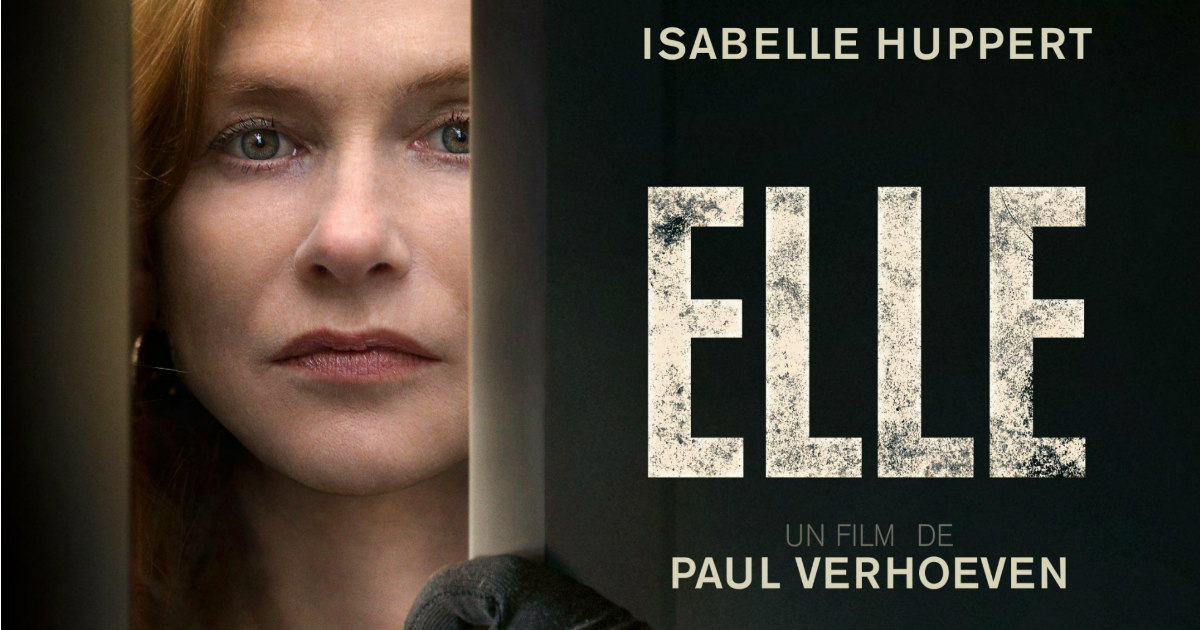
Isabelle Huppert is a fearless, committed, talented actress who takes genuine risks with many of the projects she selects, and it is for precisely this reason that her stellar track record hardly prevents me from being taken off-guard with what she can do. In Paul Verhoeven’s simply-titled Elle, she plays a rape victim trying to move on with her life. But her entire life is a grotesque cartoon – her father’s in prison for slaughtering his neighborhood decades ago (and for which she is routinely, publicly humiliated), her mother’s trying to live as though she’s in her twenties (with a bank account to buy boyfriends that suit her), her neighbors are a married couple consisting of a Jesus freak and an alluring gentleman, she’s having an affair with her best friend and business partner’s husband, and her video game company is behind schedule and over budget on a project that plays explicitly on rape fantasies.
Michèle’s life is a nonstop barrage of absurdity, and her ability to fold a traumatic event into it wavers between admirable resolve, complete denial, purposeful revenge mission, and near-sociopathic compartmentalization. Her traumatic childhood, repeated abuse, and recent rape are intermingled with her laser-focus career drive and a thousand other humorous touches that Huppert contributes – gestures, arched eyebrows, tossed-off lines, an aggressive game of footsy – to create an uncommonly dynamic, unpredictable, and electric character to guide us through the insanity the movie keeps unloading. It’s at times harrowing, but it’s also completely hilarious, neither tone far from the other for long.
Though based on a French novel (Oh… by Philippe Djian), Verhoeven originally set up the film to be an American production, with American schlock screenwriter David Birke handling the adaptation. Finding it difficult to set the project up due to its subject matter (which, despite what I outlined above, only gets more uncomfortable and provocative), he set the film up in France and even learned the language specifically to do so. I’m actually relatively unfamiliar with Verhoeven’s filmography, which has a reputation for being rather ruthless in how it portrays a society. I can only say this reputation holds especially true here, Verhoeven seemingly unafraid to attack the pretensions present in some corners of Parisian culture, which you find expressed in different ways across many Western societies. By the time Michèle destructively invites everyone in her life to a dinner party, it could almost pass for a New Yorker cartoon by way of MAD Magazine. Or a scene from The Rules of the Game.
Michèle’s learned repressive tendency can only take her so far, though, and she begins trying to take ownership of the danger presented to her in increasingly risky ways. Her rapist has begun sending taunting, sometimes threatening messages, but her past relationship with police through her father has left her wary of their involvement. She proves enormously resourceful on her own, but anytime you’ve set up a scenario that leaves a character stranded in a dangerous environment, tension runs high. Verhoeven and Huppert expertly play with that fear, letting Michèle be a vessel for it while also allowing for her reflexive reaction to simply shrug off or make light of any threat. This, of course, only adds to the tension – will a casual remark elevate her defenses or her assailant’s offenses? Is he one of the many red herrings surrounding her, or someone we’ve never met? And is she seeking him out for revenge, or something even more tangled and unusual? This is Verhoeven, so the answer to that last question may not surprise you, but he and Huppert maintain such an arch, comedic sensibility to it that what could come across as simply provocative ends up wryly amusing; which, of course, only ends up being more provocative.
After decades of thrillers glamorizing sexual violence, Elle could have been another routine, sensationalistic, and voyeuristic attempt at phenomenon. That it takes such an intelligent, sharp examination of such an unusual person and the society that has helped sustain her separates it from that nefarious pack. Verhoeven, after a decade without making a single film, has reemerged with an expert, individual style, backed up by a performance that commands through discomfort. It’s exhilarating.


